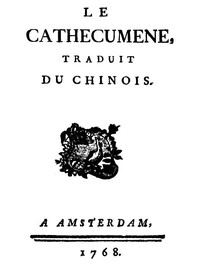Le Cathécumène, traduit du chinois by Voltaire and Charles Bordes
"Le Cathécumène, traduit du chinois" by Voltaire and Charles Bordes is a satirical philosophical work likely written in the 18th century, specifically during the Enlightenment period. This book can be categorized as a critical commentary on religion, particularly focusing on Christianity. Through its narrative, it delves into themes of faith, reason, and the absurdities found within religious practices. The story follows a protagonist who, after being shipwrecked, encounters a benevolent people with
advanced knowledge who question him about his religion. This leads to a series of absurd dialogues in which the protagonist learns about Christian doctrines and rituals in a way that highlights their contradictions and illogical elements. The narrative exposes the comedic yet troubling aspects of organized religion, such as the nature of God, the role of priests, and the various ceremonies that seem to defy reason. Ultimately, the story serves as a critique of religious dogmatism, revealing the often absurd beliefs that humans hold in the name of faith. (This is an automatically generated summary.)
Read or download for free
| How to read | Url | Size | |||
|---|---|---|---|---|---|
| Read now! | https://www.gutenberg.org/ebooks/44017.html.images | 66 kB | |||
| EPUB3 (E-readers incl. Send-to-Kindle) | https://www.gutenberg.org/ebooks/44017.epub3.images | 73 kB | |||
| EPUB (older E-readers) | https://www.gutenberg.org/ebooks/44017.epub.images | 72 kB | |||
| EPUB (no images, older E-readers) | https://www.gutenberg.org/ebooks/44017.epub.noimages | 64 kB | |||
| Kindle | https://www.gutenberg.org/ebooks/44017.kf8.images | 103 kB | |||
| older Kindles | https://www.gutenberg.org/ebooks/44017.kindle.images | 96 kB | |||
| Plain Text UTF-8 | https://www.gutenberg.org/ebooks/44017.txt.utf-8 | 60 kB | |||
| Download HTML (zip) | https://www.gutenberg.org/cache/epub/44017/pg44017-h.zip | 67 kB | |||
| There may be more files related to this item. | |||||
Similar Books
About this eBook
| Dubious author | Voltaire, 1694-1778 |
|---|---|
| Dubious author | Bordes, Charles, 1711-1781 |
| Title | Le Cathécumène, traduit du chinois |
| Note | Variously attributed to Voltaire and Bordes. |
| Note | Reading ease score: 78.3 (7th grade). Fairly easy to read. |
| Credits |
Produced by Laurent Vogel (from images generously made available by the Bibliothèque nationale de France (BnF/Gallica) at http://gallica.bnf.fr) |
| Language | French |
| LoC Class | PQ: Language and Literatures: Romance literatures: French, Italian, Spanish, Portuguese |
| Subject | Christianity -- Controversial literature -- Early works to 1800 |
| Category | Text |
| EBook-No. | 44017 |
| Release Date | Oct 23, 2013 |
| Copyright Status | Public domain in the USA. |
| Downloads | 85 downloads in the last 30 days. |
| Project Gutenberg eBooks are always free! | |

